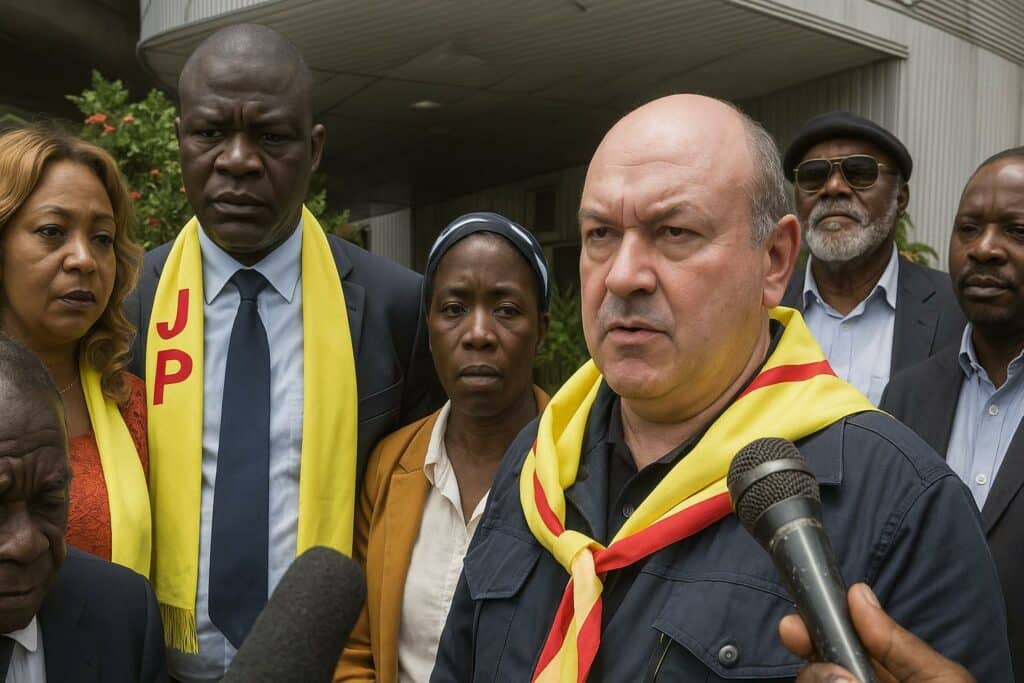A Working Visit Rooted in Political Solidarity
The gentle heat of the early November morning in Brazzaville greeted Sergei Malinkovitch, head of the parliamentary group of the Communist Party of the Russian Federation, as he stepped onto Congolese soil with a compact yet symbolically charged delegation. The visit, scheduled to extend over a full week, carries a clear mandate: to place an additional stone in the edifice of friendship that has long connected the Republic of the Congo and the Russian Federation. “Our mission”, Malinkovitch declared shortly after landing, “is to reinforce the ties of cooperation and solidarity that already unite our peoples.”
In practical terms, the delegation’s agenda orbits around the Presidential Youth Movement (Mouvement des Jeunes Présidentiels, MJP), an organisation that publicly supports President Denis Sassou Nguesso and articulates a platform inspired by progressive and socialist principles. It was at the MJP’s invitation that the Russian delegation made the journey, and Malinkovitch’s first words confirmed the political chemistry at play: “We answered the call of the MJP President, a staunch supporter of President Sassou Nguesso. Strengthening the working relationship between our two formations is our purpose.”
Ten Years of Informal Exchanges Now Structured
For Donald Mobobola, the energetic leader who has presided over the MJP since its formal inception, the presence of Russian comrades is the culmination of almost a decade of discreet yet sustained dialogue. “We have been collaborating with progressive parties in Russia for practically ten years,” he observed, recalling a first encounter dating back to 2017. “We are friends of the left. We defend the values of socialism.”
Until now, contact between the two groups had largely taken the form of virtual consultations, joint webinars on youth mobilisation, and occasional side meetings on the margins of international forums. The current stay in Brazzaville therefore marks the first time that a high-level Communist parliamentary delegation has been hosted by the MJP on Congolese territory. Both sides see the step as a natural progression: informal affinities are maturing into a structured partnership grounded in shared ideological reference points.
An Agenda Focused on Youth, Training and Mutual Support
Although the two parties have not yet released exhaustive details of their memorandum of understanding, officials familiar with the talks hint at three thematic pillars. First, youth leadership training will occupy centre stage; seminars are expected to explore methods of civic engagement, election observation techniques and policy drafting from a left-of-centre perspective. Second, cultural diplomacy will seek to consolidate the human dimension of the relationship, with exchanges in music, sport and academic research envisaged. Finally, the partners intend to develop a line of mutual political support, ensuring that each can rely on the other’s solidarity during key domestic or multilateral moments.
Positioning Within Congo’s Domestic Political Landscape
The MJP’s readiness to embrace an explicitly socialist interlocutor fits neatly within its self-presentation as a movement that aligns grassroots activism with the development priorities championed by President Sassou Nguesso. Mobobola’s statement of “unwavering commitment” to the Head of State left no ambiguity: the MJP is determined, in his words, “to accompany the initiatives undertaken by the President for the social well-being of the Congolese people.”
Observers note that the youth group’s strategy mirrors a broader inclination in Congolese politics to cultivate external partnerships that resonate with domestic policy narratives. By affiliating with the Russian Communist Party—a formation with a long historical lineage and parliamentary representation in Moscow—the MJP gains a partner that offers ideological reinforcement without altering Congo’s established diplomatic alignments.
A Congruence of Left-Wing Values Beyond Borders
For the Russian visitors, the week in Brazzaville is equally laden with symbolism. Malinkovitch repeatedly referenced the “left-wing fraternity” that binds progressives across continents and lauded the “courage of Congolese youth who strive for social justice.” Such rhetoric, while familiar in the lexicon of international socialist dialogue, takes on fresh contours in the current geopolitical context. With many nations recalibrating partnerships, the re-affirmation of people-to-people ties provides a ballast of continuity.
Moreover, solidarity of this nature does not formally commit either party to positions that might diverge from national interests. Rather, it allows each to project soft power within an ideational space—evoking, but not replicating, historical chapters of Afro-Soviet cooperation.
Prospects for a Renewed Bilateral Chapter
As the delegation’s schedule unfolds—round-table discussions, courtesy calls, site visits and, inevitably, cultural evenings—both sides express confidence that tangible outcomes will follow. Working groups have already been tasked with drafting timelines for joint programmes, and a return mission of the MJP to Moscow is tentatively envisaged for the first half of next year.
In the words of Donald Mobobola, “We are writing a new page of bilateral relations in the political domain.” Malinkovitch struck a similar chord, describing the partnership as “a bridge of friendship that our youth will continue to traverse, strengthening cooperation between Congo and Russia.” Such carefully chosen phrases echo a shared conviction: that in a world of shifting alliances, ideological kinship and personal rapport remain valuable diplomatic currencies.

